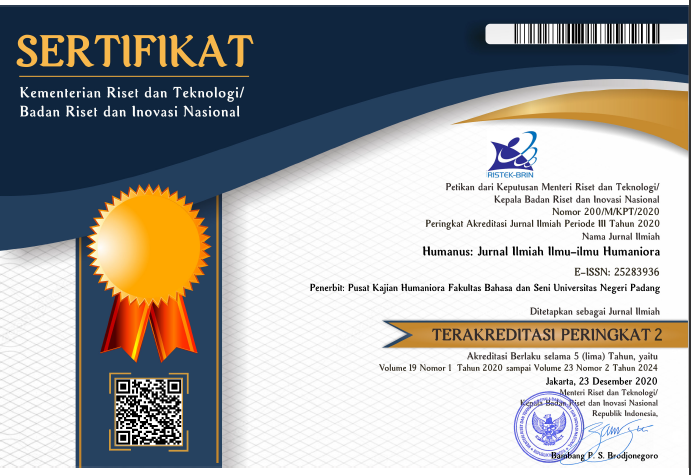Fishermen Community Participation in Tiku Awareness Tourism Group on Sustainable Tourism Development.
 ), Akifumi Iwabuchi(2),
), Akifumi Iwabuchi(2), (1) Department of Anthropology, Faculty of Social and Political Sciences, Universitas Andalas, Padang
(2) Tokyo University of Marine Science and Technology, Tokyo, Japan
 Corresponding Author
Corresponding Author
Copyright (c) 2024 Lucky Zamzami, Akifumi Iwabuchi
DOI : https://doi.org/10.24036/humanus.v23i2.125464
Full Text:
 Language : en
Language : en
Abstract
Keywords
References
Abbott, J. (2013). Sharing the city: community participation in urban management. routledge.
Aktoin, N. (2022). Peran Kelompok Sadar Wisata Dalam Meningkatkan Kesadaran Masyarakat Melalui Penerapan Sapta Pesona Di Pantai Pasia Tiku Kecamatan Tanjung Mutiara Kabupaten Agam. Universitas Muhammadiyah Sumatera Barat.
Allison, E. H., & Ellis, F. (2001). The livelihoods approach and management of small-scale fisheries. Marine Policy, 25(5), 377–388. https://doi.org/10.1016/S0308-597X(01)00023-9
Amerta, I. M. S. (2017). Community based tourism development. International Journal of Social Sciences and Humanities, 1(3), 97–107.
Antimova, R., Nawijn, J., & Peeters, P. (2012). The awareness/attitude‐gap in sustainable tourism: a theoretical perspective. Tourism Review, 67(3), 7–16.
Babbie, E. (2010). The Practice of Social Research - Earl R. Babbie - Google Kitaplar. Cengage Learning. https://doi.org/9780495598411
Bhakti, N. J. (2023). Implementasi Konsep Community Based Tourism (CBT) Dalam Mendukung Kelompok Sadar Wisata (Pokdarwis) Nagari Sungai Nyalo Mudiak Aia Kecamatan Koto XI Tarusan Kabupaten Pesisir Selatan. Histeria Jurnal: Ilmiah Soshum Dan Humaniora, 2(2), 36–43.
Bryman, A. (2016). Social research methods. Oxford university press.
Chambers, E. (2009). Native tours: the anthropology of travel and tourism. Waveland Press.
Clark, G. (2002). Culturally sustainable development. Economic Development: An Anthropological Approach, 19, 123.
Clifton, J., & Benson, A. (2006). Planning for sustainable ecotourism: The case for research ecotourism in developing country destinations. Journal of Sustainable Tourism, 14(3), 238–254.
Creswell, J. W. (2011). Controversies in mixed methods research. The Sage Handbook of Qualitative Research, 4, 269–284.
Dangi, T. B., & Jamal, T. (2016). An integrated approach to “sustainable community-based tourism.” Sustainability, 8(5), 475.
Dermawan, A. (2010). 42 Indonesian Marine Conservation Areas. Directorate of Aquatic and Marine Resources Conservation Directorate General of Marine, Coasts and Small Islands Ministry of Marine Affairs and Fisheries Republic of Indonesia.
Eriksson, B., Johansson, F., & Blicharska, M. (2019). Socio-economic impacts of marine conservation efforts in three Indonesian fishing communities. Marine Policy, 103, 59–67. https://doi.org/10.1016/j.marpol.2019.02.007
Ferrol-Schulte, D., Gorris, P., Baitoningsih, W., Adhuri, D. S., & Ferse, S. C. A. (2015). Coastal livelihood vulnerability to marine resource degradation: A review of the Indonesian national coastal and marine policy framework. Marine Policy, 52, 163–171. https://doi.org/10.1016/j.marpol.2014.09.026
Giampiccoli, A., & Mtapuri, O. (2015). Between theory and practice: A conceptualization of community based tourism and community participation. Loyola Journal of Social Sciences.
Gusriza, F. (2021). Pelaku Dalam Pengelolaan Homestay Di Kawasan Saribu Rumah Gadang Kabupaten Solok Selatan Sumatera Barat. Journal Of Tourism And Creativity, 5(1), 45–56.
Halim, A., Wiryawan, B., Loneragan, N. R., Hordyk, A., Sondita, M. F. A., White, A. T., Koeshendrajana, S., Ruchimat, T., Pomeroy, R. S., & Yuni, C. (2019). Developing a functional definition of small-scale fisheries in support of marine capture fisheries management in Indonesia. Marine Policy, 100, 238–248. https://doi.org/https://doi.org/10.1016/j.marpol.2018.11.044
Hanana, A., Elian, N., & Marta, R. (2017). Strategi Komunikasi Persuasif Dalam Menciptakan Masyarakat Sadar Wisata Di Kawasan Wisata Pantai Padang, Kota Padang. Jurnal Ilmu Sosial Mamangan, 6(1), 34–46.
Harrison, D. (2001). Tourism and the less developed world: Issues and case studies. Cabi.
Khairi, A., Sharma, J. N., & Candra, Y. (2022). Sosialisasi Implementasi Komunikasi Pemasaran Kepada Kelompok Sadar Wisata (Pokdarwis) Bukit Matoa Padang. Community Development Journal: Jurnal Pengabdian Masyarakat, 3(2), 1091–1095.
Khairunnisa, K. (2022). Pengembangan Pariwisata Pada Obyek Wisata Puncak Koto Panjang Nagari Langsek Kadok Kecamatan Rao Selatan Kabupaten Pasaman. Universitas Andalas.
Kibicho, W. (2008). Community-based tourism: A factor-cluster segmentation approach. Journal of Sustainable Tourism, 16(2), 211–231.
Lee, T. H., & Jan, F.-H. (2019). Can community-based tourism contribute to sustainable development? Evidence from residents’ perceptions of the sustainability. Tourism Management, 70, 368–380.
Markus, T. (2010). Towards sustainable fisheries subsidies: Entering a new round of reform under the Common Fisheries Policy. Marine Policy, 34(6), 1117–1124. https://doi.org/10.1016/j.marpol.2010.03.011
Martin, J. S., & Novicevic, M. (2010). Social entrepreneurship among Kenyan farmers: A case example of acculturation challenges and program successes. International Journal of Intercultural Relations, 34(5), 482–492. https://doi.org/https://doi.org/10.1016/j.ijintrel.2010.05.007
Mikkelsen, B. (2005). Methods for development work and research: a new guide for practitioners. Sage.
Nadia, S., & Jumriani, M. (2023). 10. Identification of The Process for Establishing Tourism Awareness Group (Pokdarwis) Kampung Banjar. Kajian-Kajian Lokal Kalimantan Selatan, 103.
Neuman, W. L. (2006). Social Research Methods: Qualitative and Quantitative Approaches. In social research (Vol. 8).
Ningsih, A. S. (2022). Strategi Pengembangan Pariwisata Pantai Gandoriah Kota Pariaman Provinsi Sumatera Barat. Fakultas ilmu sosial dan ilmu politik universitas diponegoro.
Okazaki, E. (2008). A community-based tourism model: Its conception and use. Journal of Sustainable Tourism, 16(5), 511–529.
Padli, Z. (2023). Strategi Kelompok Sadar Wisata (Pokdarwis) Dalam Pengembangan Objek Wisata Di Koto Panjang Nagari Langsek Kadok Kabupaten Pasaman Provinsi Sumatera Barat. Universitas Islam Negeri Sultan Syarif Kasim Riau.
Pfeilstetter, R. (2021). The Anthropology of Entrepreneurship: Cultural History, Global Ethnographies, Theorizing Agency. Routledge.
Pigram, J. J., & Wahab, S. (2005). Sustainable tourism in a changing world. In Tourism, development and growth (pp. 27–41). Routledge.
Rahajeng, A., & Maharani, N. (2018). New Institutional Economics Approach Towards Sustainable Tourism: A Community Based Ecoutourism in Ecoutourism In Ngglanggeran Village Indonesia. The 2 Nd Bali International Tourism Conference, 143.
Rahmawati, P. I., Sutajaya, I. M., & I Wayan Sukra Warpala. (2020). The Impact Of Green Tourism Initiatives Using Ergo-Entrepreneurship Orientation In Peliatan Village, Ubud, Bali. The 4 Rd Bali International Tourism Conference, 271. https://www.balitourism.or.id/
Salazar, N. B. (2012). Community-based cultural tourism: issues, threats and opportunities. Journal of Sustainable Tourism, 20(1), 9–22.
Sari, G. G., & Firzal, Y. (2019). POKDARWIS (Kelompok Sadar Wisata) Desa Koto Sentajo Mempromosikan Objek Wisata Budaya Rumah Godang. Journal of Servite, 1(2), 1–9.
Sari, R. E., Nadra, A. K., & Wimeina, Y. (2021). Pelatihan Sadar Wisata bagi Pokdarwis Luak Gadang Nagari Kamang Hilia. Jurnal Abdimas: Pengabdian Dan Pengembangan Masyarakat, 3(1), 6–10.
Stronza, A. (2001). Anthropology of tourism: Forging new ground for ecotourism and other alternatives. Annual Review of Anthropology, 30(1), 261–283.
Thorpe, A., Reid, C., van Anrooy, R., Brugere, C., & Becker, D. (2006). Asian development and poverty reduction strategies: integrating fisheries into the development discourse. Food Policy, 31(5), 385–400.
Utami, M. M., Taufik, H. E. R., & Bhakti, W. N. (2019). Village Tourism: The Implementation of Community-Based Tourism. 2019 International Conference on Organizational Innovation (ICOI 2019), 537–542.
Wahyuni, R. (2021). Pengaruh Peran Kelompok Sadar Wisata terhadap Sapta Pesona di Objek Wisata Pantai Carocok Painan Pesisir Selatan Sumatera Barat. Universitas Negeri Padang.
Walpole, M. J., & Goodwin, H. J. (2000). Local economic impacts of dragon tourism in Indonesia. Annals of Tourism Research, 27(3), 559–576.
White, A. T., Christie, P., D’Agnes, H., Lowry, K., & Milne, N. (2005). Designing ICM projects for sustainability: lessons from the Philippines and Indonesia. Ocean & Coastal Management, 48(3–6), 271–296.
Wispandono, R. M. M., SE, M. S., Nurul Imamah, S. E., & Yulistiyono, H. (2022). Penguatan Kelompok Sadar Wisata (POKDARWIS) Berbasis Pemecahan Masalah. Deepublish.
Yuan, P., Liu, Y., Ju, F., & Li, X. (2017). A Study on Farmers’ Agriculture related Tourism Entrepreneurship Behavior. Procedia Computer Science, 122, 743–750. https://doi.org/https://doi.org/10.1016/j.procs.2017.11.432
Yunanto, A., Halimatussadiah, A., & Zakaria, N. A. (2019). The impact of MPA establishment on fish extraction in Indonesia. 241(1). https://doi.org/10.1088/1755-1315/241/1/012013
Zamzami, L., & Aliman, M. (2021). The Effect Of Ecotourism Development On Marine Conservation Area In West Sumatera, Indonesia. Geo Journal of Tourism and Geosites, 38(4), 1166–1174.
Zamzami, L., Iwabuchi, A., Effendi, N., Ermayanti, Hendrawati, & Miko, A. (2019). The development of marine resource conservation in Indonesia. Journal of Advanced Research in Dynamical and Control Systems, 11(8 Special Issue), 1281–1288.
 Article Metrics
Article Metrics
 Abstract Views : 96 times
Abstract Views : 96 times
 PDF Downloaded : 64 times
PDF Downloaded : 64 times
Refbacks
- There are currently no refbacks.
Copyright (c) 2024 Lucky Zamzami, Akifumi Iwabuchi

This work is licensed under a Creative Commons Attribution-NonCommercial 4.0 International License.











